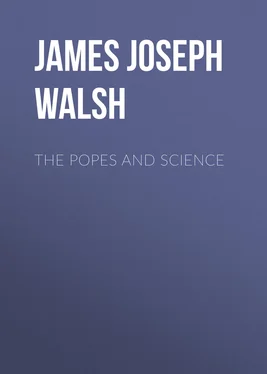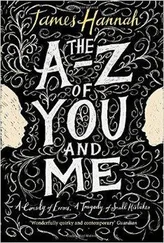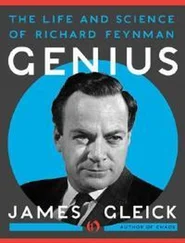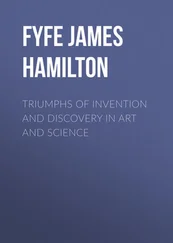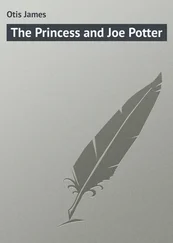James Walsh - The Popes and Science
Здесь есть возможность читать онлайн «James Walsh - The Popes and Science» — ознакомительный отрывок электронной книги совершенно бесплатно, а после прочтения отрывка купить полную версию. В некоторых случаях можно слушать аудио, скачать через торрент в формате fb2 и присутствует краткое содержание. Жанр: foreign_prose, foreign_religion, foreign_antique, на английском языке. Описание произведения, (предисловие) а так же отзывы посетителей доступны на портале библиотеки ЛибКат.
- Название:The Popes and Science
- Автор:
- Жанр:
- Год:неизвестен
- ISBN:нет данных
- Рейтинг книги:4 / 5. Голосов: 1
-
Избранное:Добавить в избранное
- Отзывы:
-
Ваша оценка:
- 80
- 1
- 2
- 3
- 4
- 5
The Popes and Science: краткое содержание, описание и аннотация
Предлагаем к чтению аннотацию, описание, краткое содержание или предисловие (зависит от того, что написал сам автор книги «The Popes and Science»). Если вы не нашли необходимую информацию о книге — напишите в комментариях, мы постараемся отыскать её.
The Popes and Science — читать онлайн ознакомительный отрывок
Ниже представлен текст книги, разбитый по страницам. Система сохранения места последней прочитанной страницы, позволяет с удобством читать онлайн бесплатно книгу «The Popes and Science», без необходимости каждый раз заново искать на чём Вы остановились. Поставьте закладку, и сможете в любой момент перейти на страницу, на которой закончили чтение.
Интервал:
Закладка:
Every advance in modern history, every modification of view that has been brought about by the critical historical method of recent times, has emphasized this point of view almost without exception. The distinguished philosophic and historical writer, the Comte de Maistre, in his Soirées of St. Petersburg about a century ago, declared that "History for the last three centuries (1500-1800) has been a conspiracy against the truth." Just about a century later the editors of the Cambridge Modern History, in the preface to the first volume of their monumental work, re-echoed the words of the Comte de Maistre almost literally in a pregnant paragraph which deserves to be in the note-book of everyone who is trying to get at the real truth of history. They said:
"Great additions have of late been made to our knowledge of the past; the long conspiracy against the revelation of truth has gradually given way, and competing historians all over the civilized world have been zealous to take advantage of the change. The printing of archives has kept pace with the admission of enquirers; and the total mass of new matter, which the last half-century has accumulated, amounts to many thousands of volumes. In view of changes and of gains such as these, it has become impossible for the historical writer of the present age to trust without reserve even to the most respected secondary authorities. The honest student finds himself continually deserted, retarded, misled by the classics of historical literature , and has to hew his own way through multitudinous transactions, periodicals and official publications in order to reach the truth.
"Ultimate history cannot be obtained in this generation; but, so far as documentary evidence is at command, conventional history can be discarded, and the point can be shown that has been reached on the road from one to the other. "
The italics in this passage are ours, but the ideas they emphasize will serve to show how necessary it is for most of us to give up the supposed historical truth of the preceding generations and have an open mind for the newer ideas that are coming in as the result of the renewed consultation of original documents and primal sources of information. The present volume is written entirely with the idea of bringing out the facts of the relations of the Popes and the Church and the ecclesiastics, especially of the centuries before the reformation, to science and to scientific education. My own position as a professor of the history of medicine has necessarily made medical science very prominent in the book. This, however, far from being a disadvantage, is really an advantage, since the physical sciences of the medieval times gathered mainly around medicine, and it was chiefly physicians and medical students who devoted most time to them. After a detailed study of the history of medical science in the Middle Ages as well of its allied sciences, it becomes very clear that there was no trace of Papal or Church opposition to science as science, and, on the contrary, liberal patronage, abundant encouragement, and even pecuniary aid for the development of scientific education in every way.
What we have tried to give in this book, then, is the authoritative refutation of the supposed prohibition of the cultivation of certain departments of medical and allied sciences by the Popes, and sufficient information to enable students and teachers of science to realize that the ordinarily accepted notions with regard to opposition to science in the Middle Ages are founded on nothing more substantial than sublime ignorance of the facts of the history of science at that time. There was no bull against anatomy or dissection; no bull against chemistry; the Popes were the patrons of the great medical scientists and surgeons; the Papal Medical School was one of the best in the world and was sedulously fostered; the great scientists of the Middle Ages were clergymen, and many of them when they died were declared saints by the Church. The opposite impression is entirely a deduction from false premises with regard to the supposed attitude of the Church and churchmen. We shall furnish abundant authorities of the first rank and of value as absolute as there can be in present day history as to these questions. The consultation of these will furnish further material for those who desire to have real knowledge of the history of science in a magnificently original and greatly fruitful period.
THE SUPPOSED PAPAL PROHIBITION OF DISSECTION
There is a very general impression that the Roman Catholic Church was, during the Middle Ages, opposed to the practice of dissection, and that various ecclesiastical regulations and even Papal decrees were issued which prohibited, or at least limited to a very great degree, this necessary adjunct of medical teaching. These ecclesiastical censures are supposed to be in force, to some extent at least, even at the present time. The persuasion as to the minatory attitude of the Church in regard to dissection is so widespread among even supposedly well-educated professional men, that, as we have said in the introductory chapter, when there was question some time ago of opening a medical school in New York City under Catholic auspices as a department of Fordham University, a number of more than ordinarily intelligent physicians asked: What would be done about the study of anatomy, since in the circumstances suggested dissection would not be allowed? This false impression has been produced by writers in the history of science who have emphasized very strenuously the supposed opposition of the Church to science, and as these writers had a certain prestige as scholars their works have been widely read and their assertions have been unquestioned, because it would naturally be presumed that they would not make them without thorough investigation of such important questions. Professional men are not to blame if they have taken such statements seriously, even though they are absolutely without foundation. That statements of this kind should have been made by men of distinction in educational circles and should have passed current so long, is only additional evidence of an intolerant spirit in those who least suspect it in themselves and are most ready to deprecate intolerance in others.
Take a single example. Most of what is said as to the opposition of the Church to medicine during the Middle Ages in A History of the Warfare of Science with Theology in Christendom, by Andrew D. White (Appleton's, New York), is founded on a supposed Papal prohibition of anatomy and on a subsequent equally supposed Papal prohibition of chemistry. These two documents are emphasized so much, that most readers cannot but conclude that, even without further evidence, these are quite enough to prove the contention with regard to the unfortunate opposition of the Church to medical science. Without these two presumably solid pillars of actual Papal documents, what is said with regard to the Church and its relations to medical science in the Middle Ages amounts to very little. Much is made of the existence of superstitions in medicine as characteristic of the Middle Ages and as encouraged by clergymen, but medical superstitions of many kinds continue to have their hold on even the intelligent classes down to the present day in spite of the progress of education, and in countries where the Church has very little influence over the people. Dr. White quotes with great confidence and absolute assurance a Papal decree issued in the year 1300 by Pope Boniface VIII., which forbade the mutilation of the human body and consequently hampered all possibility of progress in anatomy for several important centuries in the history of modern science. Indeed, this supposed Papal prohibition of dissection is definitely stated to have precluded all opportunity for the proper acquisition of anatomical knowledge until the first half of the sixteenth century, when the Golden Age of modern anatomy set in. This date being coincident with the spread of the movement known as the Protestant Reformation, many people at once conclude that somehow the liberality of spirit that then came into the world, and is supposed at least to have put an end to all intolerance, must have been the active factor in this development of anatomy, and that, as Dr. White has indeed declared, it was only because the Church was forced from her position of opposition that anatomical investigation was allowed.
Читать дальшеИнтервал:
Закладка:
Похожие книги на «The Popes and Science»
Представляем Вашему вниманию похожие книги на «The Popes and Science» списком для выбора. Мы отобрали схожую по названию и смыслу литературу в надежде предоставить читателям больше вариантов отыскать новые, интересные, ещё непрочитанные произведения.
Обсуждение, отзывы о книге «The Popes and Science» и просто собственные мнения читателей. Оставьте ваши комментарии, напишите, что Вы думаете о произведении, его смысле или главных героях. Укажите что конкретно понравилось, а что нет, и почему Вы так считаете.
